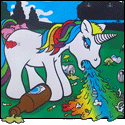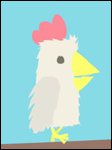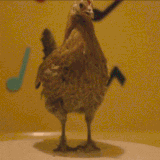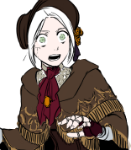- Soonmot
- Dec 19, 2002
-
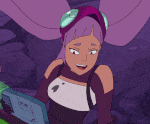
Entrapta fucking loves robots



-
Grimey Drawer
|
We're getting 4 chapters today because the last two are super short and that's it for book 1!
quote:
IMPACT
CHAPTER 21
“THAT’S THE ROCK.”
“Mo. Wake up.”
Mo’Steel opened one eye. Then the other. Jobs was leaning right over him. “Are we there?”
Jobs shook his head. “No. You’ve only been under for a couple hours.”
“Huh.” He snorted, rubbed his nose, and sat up. “What’s it about, Duck?”
“Bad stuff, Mo. People getting shot. Some crazy kid and his big brother got in, shot that Marine sergeant.”
“That hot-looking black fem?”
Jobs cocked an eyebrow. “I didn’t really think about whether she was hot, Mo.”
“Mmm. You wouldn’t. So things are screwed up and we’re gonna auger into the sun or whatever and you woke me up so I wouldn’t miss it?”
“Kind of. Here’s the thing: One of the pilots is dead. The other is injured. Some kind of solar sails or whatever won’t deploy. Unless someone goes outside.”
Mo’Steel blinked. Then his eyes lit up. “Outside? Ride the big rocket from the outside?”
For a moment Jobs thought his friend might cry. Mo’Steel grabbed his arm and squeezed. “You’re the best, man.”
seriously love mo
“The commander wanted to know if you’d do it. It’s dangerous. Very dangerous. The suits won’t fit us, the jetpacks are hard to control, we screw up at all and we could end up being separated from the ship. That’d mean we’d probably orbit till we entered the atmosphere and burned up.”
Mo’Steel sat bolt upright. “Let’s go!”
“You’re a dangerously disturbed person, Mo. But one more thing before you say yes: the Rock. It’s coming. We have a very small window for an escape burn to push us out of orbit. The calculations are all based on the sails being deployed before the burn. Colonel Willett may have to light the rockets while we’re still out there.”
“Very woolly,” Mo’Steel agreed, nodding with approval, as though this particular ride had been worked out just for his amusement. “Hey! We’re weightless.”
“Yes. You can thank me later.”
They suited up as quickly as they could with one-armed help from Willett. Slipping into a suit to hide as D-Caf had done was one thing. Actually donning the suit properly so that it would work out in the vacuum of space was another.
Willett walked them through the procedure as well as he could while simultaneously prepping the ship for a burn with his one good hand. Jobs noticed that he had Mark’s revolver on his lap. Jobs wondered how many rounds were left.
“You’ll need to loosen all the bolts holding the sheathing in place. Cast the sheath off. This is important: Don’t throw it forward or back, throw it away from the ship.” He made a motion with both hands and winced at the pain. “And remember your basic physics: equal and opposite reaction, right?”
“Under the sheathing you’ll find the sails coiled up. It’ll look like a big wad of Mylar. Crumpled-up foil. Supposedly this stuff, though, has a shape memory. Meaning, once you crank the ‘mast’ all the way out, the sail should snap into place and spread out on its own. Should. No one’s ever tested this. Like I told you, the calculations — such as they are — call for the sails to be fully deployed prior to escaping orbit. I don’t know how critical that is. Figure we should do our best.”
Mo’Steel nodded. “Don’t worry, Captain. My boy’s got the tech chops.”
Willett looked at Jobs with a flicker more interest. “Steven Jobs, huh? That’s the name you chose? Not Gates or Boole or Eckert or Shastri?”
Jobs smiled. “Steve Jobs made a revolution in a garage.”
DON'T GET ME loving STARTED ON THIS BULLSHIT, JOBS!!
“Fair enough,” Willett said with a sigh. “One of my own boys is pretty good at . . .” He fell silent. He glanced at the revolver. “Okay. I punch up the burn in twenty-five minutes. The Rock . . . it’s going to happen soon. I’ll call you in at the five-minute point. That’s just maybe enough time to get into the airlock and brace yourself.”
“Mmmm.” Mo’Steel rocked back and forth on the balls of his feet, anticipating the rush. No time for more. No time for anything like the usual NASA care and caution and endless preparation.
Jobs caught sight of a small framed picture wedged into one of the control panels. It showed a middle-aged woman, a girl, and two boys, all in their early twenties or late teens. He wondered if he should say something. But here, now, more than at any time in his life, Jobs found the right words would not come. He wondered if he should take the gun. But how could he explain it?
Watching a wreck, watching a slow-motion disaster, unable to do anything, anything at all to stop it. Unable even to think of comforting words. Powerless . . .
Jobs turned away. Mo’Steel slapped his shoulder, oblivious, of course, to his friend’s particular concern. They sealed each other’s helmets and stepped into the miniscule airlock. Waited while the air was sucked away, drawn back into the ship.
The indicator light was green.
Mo’Steel threw the latch and levered the hatch open.
Earth was right there, right there, filling the frame. Mo’Steel pushed off very slowly and drifted up through the hatch, or down through the hatch, or left or right or whatever. It was all the same, he thought happily. He drifted through and arrested his movement by reaching down to grab the hatch threshold. He extended outward, legs pointing at Earth. He reached down to lift his friend up/down after him.
Jobs floated out into space, held Mo’Steel’s hand, and they both looked back along the orbiter’s back. The tall tail just touched the rim of the planet. The disorientation was extreme and impossible to resist. The ship was above, below, Earth was down or up, impossible. Hard not to feel like that big old ball, that blue and green and brown ball in the black sky was going to fall on them and crush them. At the same time, it was hard not to feel like you were falling, like you ought to be screaming.
It was impossible to make any sense of it. At least it would be to Jobs, Mo’Steel realized. Funny how you could see tension even through a space suit. It was the way Jobs held himself, all clenched up. Clenched up and hanging upside down above the big ball.
“Don’t think it, Duck,” he advised. “Gotta just do, not think. Follow me.”
Jobs closed his eyes, tried to dispel the sense that he was falling. Opened his eyes again, and this time narrowed his gaze, focused on his friend. This was Mo’s thing, follow Mo. Mo’Steel held Jobs’s shoulder, got behind him, and keyed his maneuvering jets. The two of them eased forward, Jobs balanced like a clumsy but insignificant weight.
They flew at a snail’s pace. Willett had emphasized conserving the maneuvering jets. So they flew very slowly above the orbiter, passing along the long, tight-closed seam of the payload bay, within which slept the Eighty, oblivious, unaware.
“There are the pods,” Jobs said.
“Left or right?”
“Left.”
Mo’Steel keyed his thrusters and they changed vector to intercept the pod on the left wing.
“I think I can land right on it,” Jobs said and stuck his feet out.
“I don’t think so, Duck. Gotta kill momentum with the jets. You’d just bounce off.”
Moments later they were stopped dead — relative to the shuttle. In reality they were traveling at 18,000 miles per hour, give or take. But the elongated pod now appeared to be hanging vertically in front of them, hanging on a long, curved, white wall.
“Wrench,” Jobs said. He felt more comfortable now. This was man and machine. He could do that.
“Forgot the wrench,” Mo’Steel said.
“What?”
“Joke. Untie the gut-knots there, ‘migo.”
Jobs cursed Mo’Steel under his breath, took the wrench, and began loosening bolts. There were twelve, all around the edge of the thin sheathing. He took each bolt and stuffed them into a net bag hanging or floating from his waist.
On the seventh bolt he noticed the small round hole.
“There’s what did it, there’s what cut the wire. Bullet hole. Must have been a stray round from the fight on the ground.”
“Hey, look,” Mo’Steel said.
“What?”
“Is that it?” Mo’Steel tapped Jobs’s shoulder and pointed.
Jobs looked. A small, tumbling, moving object that caught and reflected the sun’s light. Small at least compared to the immensity of the planet. How could that rock possibly hurt this beautiful planet? Surely somehow it would stop, or miss, or not really do the damage everyone said.
Surely not.
People wouldn’t die. No. Continents would not be shattered. No. Something would stop it, something, someone would not let it happen.
“Yeah, Mo. That’s it,” Jobs said. “That’s the Rock.”
gently caress me, the kids are actually going to see the earth get destroyed.
quote:
CHAPTER 22
“TWO WHOLE SECONDS TO SIT HERE AND CHAT.”
They pushed the sheath away. Jobs squeezed his arm and shoulder and part of his upper body into the tight gap between the folded mast and the outer shell of the shuttle. Mo’Steel had to squeeze in beside him to hold down a latch-pawl to allow the crank to turn. Jobs turned the small hand crank once. Twice. Almost impossible to get any kind of leverage. He was eating up time and knew it. But the gloves were bulky and way too big, the space too tight.
He turned again and again and nothing happened.
The Rock was in view. Coming. Coming. No drama, no tail of sparks, no swooshing sound. It occurred to Jobs that it was a pretty lame special effect.
The mast began to lift. Now there was more room, and now he could get leverage, with Mo’Steel anchoring him. The crank turned quickly. The mast rose, as thin as a kid’s fishing rod. The crumpled foil sail rose, too, like wadded-up tinfoil.
Up and up.
Slow. Too slow.
“Boys, this is Colonel Willett. I see you’re making progress, but we’re ten minutes to burn.”
Jobs keyed his intercom. “Right. Almost have the left sail extended. Mo, I’m wearing out: Take a turn.”
They traded places and Mo’Steel spun the crank as fast as he could. Each working till he was sweating and gasping, then handing it off. At last the crank stopped. The sail was extended.
They jetted as quickly as they could over the hump of the shuttle’s back to the right wing. Removing the sheathing was easier this time. They squeezed themselves into place and started to turn the crank.
“Gotta call time, gentlemen,” Willett said. “Maybe one sail deployed is enough.”
Jobs said, “Commander Willett, I’m not an astrophysicist, but aren’t we talking about calculations for escaping solar orbit? I mean, we can burn our way out of Earth’s orbit, but then we have to loop the sun and head out without being captured by the sun’s gravity, right? If we mess with the formula we could end up in orbit forever. Or worse.”
“Son, these calculations are half guesswork anyway. You have to understand, this isn’t the usual NASA mission. No one knows anything for sure.”
Jobs looked at Mo’Steel, caught his attention. He lifted his gold visor and pressed his helmet into contact so they could talk without using the mike and being overheard.
“Mo. I think maybe we gotta do this. But he has to fire the rockets. Maybe we can use our tethers, stay alive, hold on . . .”
“Ride the big rocket and Mother G trying to kill us real hard? You asking or telling?”
“You in?”
“What, like you’re going to take a ride while I bunny?” Mo’Steel laughed, but not happily.
He knew the difference between wild risks and sheer suicide. “I’ll ride along with you, Jobs.”
Jobs keyed his mike. “Commander, we’re staying out here.” He began cranking again, winding as hard and fast as he could.
So the book has been so good at subverting expectations that I fully believe one or both of these kid could die.
“Three minutes to burn,” was Willett’s only answer.
Jobs and Mo’Steel cranked wildly, spelling each other every minute to keep the speed up, smooth now, practiced. The mast extended languidly. The sails grew. Not fast enough. Not fast enough.
“Two minutes,” Willett said. “There’s a sort of carabiner on your belts. You can clip it to the loop on your lifeline and then clip the carabiner to the sail crank itself.”
“Roger that,” Jobs gasped.
“Roger that?” Mo’Steel mocked. “You gone astronaut now?”
“One minute. Repeat, one minute.”
The mast rose. Up and out, impossibly far, with spiderweb veins extending much farther still, extending the Mylar for thousands of square feet. Fully extended, each sail could have blanketed a pair of football fields.
“Thirty seconds.”
“Let me in,” Mo’Steel yelled. He grabbed the crank and worked it like a fiend.
Jobs found the carabiner and with numb fingers snapped it through the loop in his own lifeline. Now for Mo’Steel.
“Twenty.”
Where was his friend’s carabiner? “Turn a little, Mo!”
“I’m turning as fast as I can!”
“I mean your body. Turn this way!”
Jobs snatched the carabiner. It spun away, cartwheeling through space. A desperate lunge, a grab with clumsy gloved fingers.
“Ten seconds to burn.”
He snagged the carabiner. Snap!
“Eight . . . seven . . .”
He lunged, drew Mo’Steel’s lifeline up, and snapped the carabiner onto the handle.
“Six . . .”
Mo’Steel yelled, “What are you doing? I can’t turn the thing if —”
Jobs pulled himself up, too fast, slammed his shoulder into the shuttle skin, spun outward, dangling in space.
Mo’Steel grabbed his arm, pulled him down, yanked the lifeline, and snapped it into place. “Three . . .”
“See? Plenty of time,” Mo’Steel said. “Two whole seconds to sit here and chat.”
“One.”
Less than twenty feet away, the orbiter’s engines exploded into life. No smoke, no roiling cascade of superheated gas, just a jet as neat and symmetrical as a gas stove. Jobs and Mo’Steel were slammed hard downward. Suddenly there was a downward.
Suddenly there was weight as well as mass. Jobs was hanging by his waist, feeling like he weighed two tons. It was not the exorbitant acceleration of liftoff, but it still squeezed his lungs, bent him back, turned his spine into a letter U.
He was upside down, hanging head downward now, a tin can tied to a speeding car. The lifeline was extended fully, and stretching. The cone of fire was only a few feet below, blue-bright, weirdly silent. Was he going to die? Was it now, his death?
He remembered the kid, the strange sleepwalking kid, Billy Weir. “You’ll be there,” he’d said to Jobs. “You’ll be there.”
Where? There.
The burn obscured a part of the planet turning beneath him. But the shuttle was rotating slightly at the same time, and now he could see the Rock.
“Mo! Are you okay?”
No answer. Maybe he hadn’t keyed his mike. Maybe the burn was blanking out the signal. Or maybe Mo wasn’t there to answer. The acceleration seemed to go on forever. He had been hanging there, dangling helpless,
straining for every breath forever.
And suddenly, all at once, it ended.
The cone of fire was gone. The acceleration ceased. The ship was now moving at better than 25,000 miles per hour, but once again the sense of speed disappeared along with the sense of weight.
No death. Not yet.
“You boys still there?” Willett called.
“I’m okay,” Jobs answered.
“Aaahhhh! Aaaahhhh!” Mo’Steel screamed into his mike.
“My friend is okay, too.”
“Head for the airlock, you did good,” the commander said.
Jobs moved hand-over-hand with ease up the length of the lifeline. Mo’Steel met him at the crank and they unhooked.
“Okay, that beat The Pipe,” Mo’Steel said.
But Jobs didn’t answer. He put his hand on his friend’s shoulder and pointed. Mo’Steel turned and the two of them hung there, suspended, side by side, as the Rock came to the end of its long trip.
quote:
CHAPTER“IT’S OVER.”
23
Up close, so near Earth, the Rock looked very small. Seventy-six miles in diameter, it was nothing next to the planet measured in thousands of miles. But, up close, so close, Jobs could see the speed of it. Against the backdrop of space you couldn’t sense the awesome speed. But now, as it angled into the atmosphere, in the brief second in which it could be seen outlined against blue ocean, it seemed impossibly fast. The Rock entered the atmosphere and for a flash became a spectacular special effect: The atmosphere burned, a red gash in its wake.
It struck the western edge of Portugal. Portugal and Spain were hit by a bullet the size of Connecticut. The Iberian peninsula was a trench, a ditch. The Mediterranean Sea, trillions of gallons of water, exploded into steam. Every living thing in the water, every living thing ashore, was parboiled in an instant. Portugal, Spain, southern France, all of Italy, the Balkans, the coast of northern Africa, Greece, southern Turkey, all the way to Israel was obliterated in less than five seconds. They were the cradles of Western civilization one second, a hell of superheated steam and flying rock the next.
The destruction was too swift to believe. In the time Jobs could blink his eyes, Rome and Cairo, Athens and Barcelona, Istanbul and Jerusalem and Damascus were gone. Not reduced to rubble, not crushed, not devastated. This wasn’t like war or any disaster humans understood. Rock became gravel, soil melted and fused, water was steam, living flesh was reduced to singed single cells. Nothing recognizable remained. The impact explosion was a million nuclear bombs going off at once. The rock and soil and waters that had once defined a dozen nations formed a pillar of smoke and flying dirt and steam. The mushroom cloud punched up through the atmosphere, flinging dust and smoke particles clear into space.
Jobs could see a chunk of Earth, some fragment left half-intact, maybe twenty miles across, spin slowly up in the maelstrom. There were houses. Buildings. A hint of tilled fields. Rising on the mushroom cloud, flying free, entering space itself.
The entire planet shuddered. It was possible to see it from space: The ground rippled, as if rock and soil were liquid. The shock wave was an earthquake that toppled trees, collapsed every human-built structure around the planet, caused entire mountain chains to crumble. The oceans rippled in tidal waves a thousand feet high. The Atlantic Ocean rolled into New York and over it, rolled into Charleston and over it, rolled into Miami and washed across the
entire state of Florida. The ocean waters lapped against the Appalachian Mountain chains, swamped everything in their way, smothered all who had not been killed by the blast or the shock wave.
People died having no idea why. People were thrown from their beds, dashed against walls that collapsed onto them. People who survived long enough to find themselves buried alive beneath green sea many miles deep. Jobs saw the planet’s rotation slow. The day would stand still for the few who might still be alive.
The impact worked its damage on the fissures and cracks in Earth’s crust. Jobs watched the Atlantic Ocean split right down the middle, emptying millions of cubic miles of water as if it was of no more consequence than pulling the plug on a bathroom sink.
The planet was breaking up. Cracking apart. Impossibly deep fissures raced at supersonic speeds around the planet. They cut through the crust, through the mantle, deeper than a thousand Grand Canyons.
Now the Pacific, too, drained away. It emptied into the molten core of Earth itself. The explosion dwarfed everything that had gone before. As Jobs watched, motionless, crying but not aware of it, Earth broke apart. It was as if some invisible hand were ripping open an orange. A vast, irregular chunk of Earth separated slowly from the planet, spun sluggishly, slowly away. The sides of this moon-sized wedge scraped against the sides of the gash, gouged up countries, ground down mountains.
And now this wedge of Earth itself broke in half. Jobs saw what might have been California, his home, turn slowly toward the sun. If anyone is left alive, he thought, if anyone is still alive, they’ll see the sunrise this one last time.
Earth lay still at last. Perhaps a quarter of the planet was bitten off, drifting away to form a second and a third Earth. The oceans were gone, boiled off into space. The sky was no longer blue but brown, as dirt and dust blotted out the sun. Here and there could still be seen patches of green. But it was impossible to believe, to hope, that any human being had survived.
All of humanity that still lived was aboard the shuttle that now slid slowly toward the distant sun.
The mike crackled to life. “Come on in, boys. It’s over.”
that was some very evocative writing
quote:
CHAPTER 24
“PUT ME TO SLEEP, OR KILL ME, BUT MAKE IT STOP.”
In his berth Jobs swallowed the tube, forced it down into his stomach. The transparent lid closed over him. Sleep. Sleep. Death. What did it matter? How did you live when your world was dead?
He felt the drowsiness of hibernation. Do it faster, he thought, put me to sleep, turn off my brain. Turn the lights out on the movie in my head, the pictures of all the faces, all the people I’ve known, the ones I liked and loved, the ones I cared nothing for, the ones I never knew.
“Put me to sleep, or kill me, but make it stop,” he whispered.
He was still awake to hear the distant, muffled explosion. A gun. Colonel Willett would not be coming along on this trip.
Sleep took Jobs. And Mo’Steel. The hibernation equipment slowed their hearts and then stopped them. Slowed the bouncing electrical impulses in their brains, and stopped them. They were as dead as the people of Earth, but with at least a hope of rebirth somewhere, sometime.
Tamara Hoyle was already deep in the hibernation death-sleep. But the technology had never been designed for pregnant women. The machine knew nothing of the fetus inside her.
2Face slept, her berth between those of her parents.
Yago slept, as alone now as ever.
D-Caf slept, calm at last.
Billy Weir lay unmoving, his body paralyzed. He could not hear. Could not see. Could not move. The hibernation equipment slowed every process, stopped every activity. But Billy Weir did not sleep. His brain did not shut down.
The Mayflower fell toward the sun, accelerating all the while, faster and faster yet still painfully, pitifully slow in the distances of space. It would fall toward the sun for years. And slowly come around the sun, for years. And gain still more speed and race away from the sun and past the shattered remains of dark Earth for years stretching into decades.
Centuries.
And still, Billy Weir would not sleep.
Well that's ominous.
|

 I appreciate the extra little bit of gruesomeness of having her see what's happened to her before she dies, rather than just painlessly, instantly die in the blast. I feel like the latter is what a lot of series would do if they were going to have this kind of character death.
I appreciate the extra little bit of gruesomeness of having her see what's happened to her before she dies, rather than just painlessly, instantly die in the blast. I feel like the latter is what a lot of series would do if they were going to have this kind of character death.










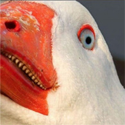


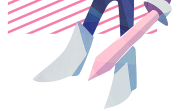


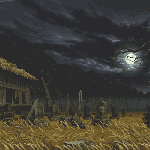
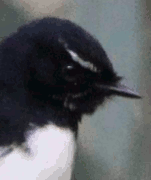


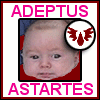

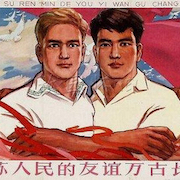
 `
`
